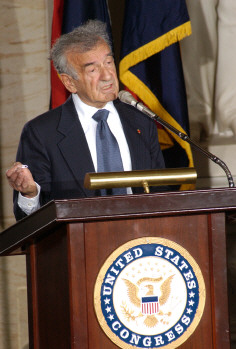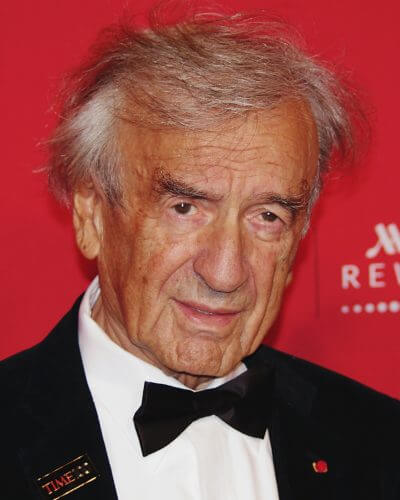In 2008, Wiesel was interviewed by phone in preparation for a visit to an event with the participation of Nobel laureates that took place later that year at the Technion. It turns out that Nobel Prize winners from all over the world already tried to stop the boycott of Israel and failed. The interview was held in Hebrew
The original news from March 12, 2008
According to him, the dedication of scientists on a mass scale in favor of a dangerous regime as happened in Nazi Germany is not repeated, with the exception of a few who helped the Iranian nuclear program who do not receive support from the Academy

A busy week is expected for Prof. Elie Wiesel at the XNUMXth Independence Day events of the State of Israel. He will be one of the torch-lighters on the eve of Independence Day on Mount Herzl, will receive an honorary doctorate at Tel Aviv University, and will speak at the closing plenary of a special salute event in honor of sixty years of science in the State of Israel, which will be held at the Technion ahead of next Independence Day with the participation of ten Nobel laureates.
"The subject of my lecture will be 'The limits of scientists - ethics and science'. The question arises as to what are the boundaries between ethics and science. In my opinion, science without ethics can be dangerous, not always. We have already seen, especially in medical science, that doctors who must only do good and heal became Nazis and performed medical experiments on the Jewish prisoners in Germany and Poland. If morality is not exactly the limit, where can it lead.
Does this have any implications for today? Maybe in Darfur or what happened in Bosnia a few years ago?
"I was one of the first to expose the atrocities in Darfur and warn about the humanitarian crisis there. I went to Bosnia at the time myself. About two years ago I spoke before the UN assembly at the first ever conference that dealt with the Holocaust. My question was will the world ever learn? But the world did not learn. We thought in 2005 that he had learned and that such things would not happen again and here today a wave of hatred is spreading all over the world. It is very dangerous but there is one difference. Today, scientists are in no hurry to take part in the atrocities of totalitarian regimes."
Do not the scientists in Iran deviate from the rules of morality?
"Even in Iran they don't do such horrific things as the Nazis did in the concentration camps. However, the greatest enemy of the free world is Ahmadinejad. I recently began a journey to convince the world of the importance of the threat posed by this man. I organized a large conference in Paris with the participation of 500 people and 18 lecturers. Then we planned something bigger on a European scale, but in the meantime the report of the American intelligence services was published stating that Iran is not close to creating an atomic weapon and we were forced to stop this journey. But I intend to renew it. First of all, this is a disgusting person who says that Israel needs to be destroyed and cries over the death of a murderer (Mornia), and who is received in all kinds of countries in the world with great respect, this is a shame and disgrace."
"However, I am receiving information from Iran that the university students are hostile and are the biggest opponents of Ahmadinejad. Unfortunately, in the nuclear field there are scientists from all over the world who come to help Iran produce atomic weapons. But this is not a global phenomenon. It is hard to believe that there are scientists in Paris or London or the USA who would be able to create an atomic weapon to deliver it to a terrorist."

In England, academic unions are trying to boycott Israel and the universities in Israel. You are known as one of the harshest voices against this boycott, what can be done?"We stopped it. I organize together with King Abdullah every year a conference of Nobel laureates in Petra. Two years ago we organized a petition as part of this conference and it didn't help because the issue came up again last year. A year ago we again organized a petition against the renewed decision, this time we also accompanied it by publishing a whole page in the New York Times and the Herald Tribune. A few days later they in England decided to postpone this boycott and, as far as I know, for an unlimited time."
What do you know about the academy in Israel?"I have many colleagues at universities in Israel. I must point out that the level of academia in Israel is very high. The professors who want to come to the USA for a sabbatical or to France find it very easy to get places thanks to the good reputation of the Israeli higher education institutions. Aharon Chechenover is a good friend of mine, although it is worth noting that most of my friends are from the humanities and philosophy and I am not that familiar with what happens in the exact sciences."
Is defending Israel, as you do, getting easier or getting harder?
"It is not easy to defend Israel mainly because of the extreme left, which unfortunately also includes some Jews and Israelis. I do not criticize Israel because I do not live there. No one heard any criticism from me."
How to deal with media hostility in the world against Israel?
"Journalism must also be educational. I have been teaching journalism for 40 years. If I lived in Israel, I would go back to writing two columns a week in the press. Would I set up a television program in Israel for the rest of the world to fight programs that are so against Israel or harmful to Israel?"
What do you wish for the State of Israel in general and the Technion in particular in the state's sixtieth year?
"Inner peace and true peace".
Ten Nobel laureates at the salute event
Ten Nobel laureates will participate in a special salute event in honor of sixty years of science in the State of Israel, which will be held at the Technion in preparation for next Independence Day. Professor Michael Aviram from the Rappaport Faculty of Medicine at the Technion, the organizer of the event, said that the response to the Technion's initiative by the Nobel laureates was great and enthusiastic.
The Nobel laureates who will participate in the event that will be held at the Technion campus on Monday, May 19, 2008, will be:
Prof. Robert Uman from Israel, winner of the 2005 Nobel Prize in Economics;
Prof. Gunter Blubel from the USA, winner of the Nobel Prize in Chemistry in 1987
Prof. David Gross from the USA, winner of the Nobel Prize in Physics for 2004;
Prof. Tim Hunt from Great Britain, winner of the Nobel Prize in Medicine for 2001;
Prof. Avraham Hershko from Israel, winner of the 2004 Nobel Prize in Chemistry;
Prof. Kurt Wuttrich from Switzerland, winner of the Nobel Prize in Chemistry for 2002;
Prof. Elie Wiesel from the USA, winner of the 1986 Nobel Peace Prize;
Prof. Jean-Marie Len from France, winner of the Nobel Prize in Chemistry in 1987;
Prof. Farid Mord from the USA, winner of the Nobel Prize in Medicine for 1998;
Prof. Aharon Chachanover from Israel, winner of the Nobel Prize in Chemistry for 2004;
The event will be opened by the president of the Technion, Professor Yitzhak Apluig, with a lecture on the topic: "From Chemistry to Medicine". The guest lectures will include diverse and fascinating topics such as "from basic to applied science", "science as an adventure", and "the future of physics".
The event will be open to the general public and scientists and students from all over the country will be invited to it. The Nobel laureates will meet with outstanding students and scientists in their fields of research, visit the relevant faculties at the Technion and travel in the north of the country.

6 תגובות
It is appropriate that scientists only deal in the scientific field in which they specialize and not in politics, which they understand no more than the average person on the street.
It is so sad to read this, but who is to define what a dangerous regime is, some will say that it is so in Israel (even though it is absolutely not true) but in Iran they also say so, groom For the future.
How sad to read what he says
"I decided to convince the world that Ahmadinejad is crazy"
Simply all the ugliness of humanity is in this sentence
I came across this website in a comment that someone said
that he doesn't understand why people talk about the end of the world [mankind]
There won't be one
Well, that's why it's not the Persians who say it
These are actually the best of us
who cannot stand and watch the injustice of the world
And in their subconscious they wish for the end of everything out of desperation for logic
For now it is too late to take an important place in the events of the Earth
Maybe it won't be like that, but it's better to be like that as long as one of us is indecisive and one suffers
Just so that the one who is in doubt can feel good about himself
"Because if everyone were beautiful then no one is beautiful"
Of course that's not what I came to say
I say that it is completely possible to understand the direction of thought or in short
"I recently started a journey aimed at convincing the world of the importance of the threat from this man"
hence the best of us cry for the a-bomb